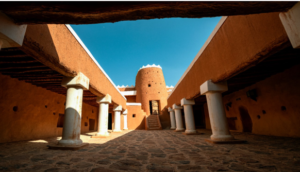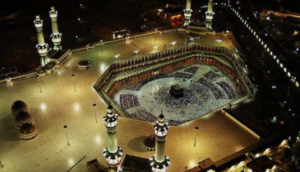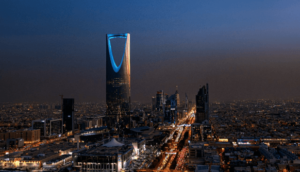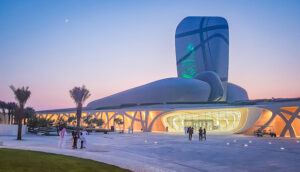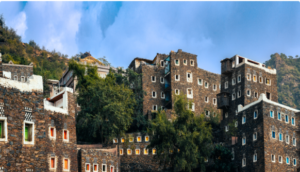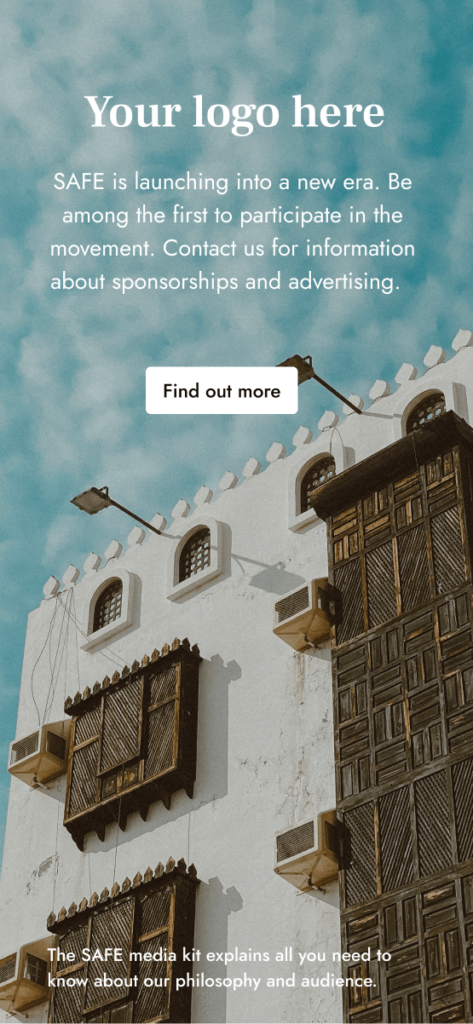Saudi Tourism Authority CEO Fahd Hamidaddin played a central role in the GCC Summit: Streamlining and Strengthening Tourism, held at the Arabian Travel Market in Dubai on 6th May 2024.
The event brought together key ministers and industry leaders from across the Gulf Cooperation Council (GCC) to explore collaborative strategies for enhancing tourism in the region.
Hamidaddin gave his insights on the new Unified GCC Tourist Visa, improved connectivity, and joint destination management. His vision, coupled with contributions from other GCC leaders, aimed to strengthen the region’s collective tourism value and align collaborative efforts for a prosperous future.
Key Participants:
Moderated by Richard Dean, journalist and presenter of The Business Breakfast on Dubai Eye, the panel (introduced by H.E. Abdullah bin Touq Al Marri, Minister of Economy – UAE) included:
- Fahd Hamidaddin, CEO of Saudi Tourism Authority
- H.E. Khalid Jasim Al Midfa, Chairman of Sharjah Commerce and Tourism Development Authority
- H.E. Azzan Al Busaidi, Undersecretary of Tourism – Oman Ministry of Heritage and Tourism
- H.E. Sarah Buhijji, CEO of Bahrain Tourism and Exhibitions Authority

During the summit, Hamidaddin emphasised Saudi Arabia’s commitment to transforming tourism in the GCC region and beyond. His comprehensive remarks outlined the significant strides already made and offered a vision for future collaboration:
Access and Connectivity:
“The government’s job is to create the right platform for the private sector to be dynamic. Access is one thing that is within the realm of governments.
“Before I talk about what we can do, I think it’s worth starting with what we’ve done. Usually, they say the best indicator for future performance is past performance. Last year, we adopted a new eVisa for all residents of the GCC because we trust the security measures. We also started renovating our borders with several countries and will continue doing so.
“When it comes to access, connectivity with high capital infrastructure investments where only governments can take the lead. Having a railway system that connects us will also be a game changer. Whether it’s regulations or infrastructure projects, the governments recognise the opportunity for all.”
Unified GCC visa and joint marketing efforts:
Plans for joint packages and joint marketing campaigns were discussed, as well as the development of railway links within and between GCC nations. The Unified GCC Tourist Visa, expected to launch soon, will streamline travel between member states, creating unprecedented ease of movement.
Hamidaddin addressed the issue of competition between GCC countries and sub-destinations within each country:
“I think this is the most important question. We have buyers and sellers in the room. My message to the sellers is, ‘Don’t sell this region softly. Sell it with big promises.’ You have a track record of surpassing the world on recovery. We’re 20% higher than the rest of the other regions around the world. You can talk about Saudi growing at 56%, which is the highest of the G20 countries. But more importantly, we are the largest investing country in the world in tourism. We’re making big bets.”
He continued, “For the buyers, this commitment and this growth is not just about scale and numbers. We are committed to building a destination that is the most sustainable in the world. We are committed to remaining authentic. We are in a travel market titled ‘Arabia.’ Arabia is the common ground, the common culture, the common language, and has so many beautiful assets that the world is eager to discover.”
When asked which travel “purpose” would most benefit from the new GCC visa, Hamidaddin said, “I can confirm it will benefit all travel purposes. Not just MICE, not just leisure, not just friends and family. All travellers. Especially long-haul travellers.”
Encouraging Healthy Competition:
“What I would like to stress is that while governments collaborate to create a greater economy, a greater global magnet as a region, the private sector must compete, and let competition drive the best experience for tourists worldwide. Whether it’s between Riyadh and Jeddah, or Riyadh and Dubai and Manama, or between two hotels in the same city of Riyadh, we want competition. And feedback when we fail is a gift. That’s what keeps us innovating and improving and delighting the travellers of the world.”
Complementary tourism and collaboration opportunities:
“Let’s talk about an opportunity for us to collaborate or complement each other’s offerings. Typically, in the GCC, summer is known to be a low season. However, as we are in Dubai, I can talk about the great success of Dubai in creating indoor offerings beyond the shopping. But that is a solution to beat the heat, and every city is doing the same. However, there are also the Arabian highlands, from the Sultanate of Oman to the south of Saudi Arabia. Many people in the room may not know what a beautiful destination the Arabian highlands are. When it’s boiling hot in the capitals, it’s low 20s and raining and green in the south. That’s just one thing that we are making big bets and investing big in as well.”

A harmonised calendar… and cruise industry growth:
During the summit session, it was suggested that the calendar of mega-events around the GCC should be harmonised to benefit all players. Hamidaddin welcomed the idea:
“I really love the suggestion of aligning our calendar, at least for major events… not only the ones we host individually, but also if we want to get the Taylor Swifts of the world, we can collaborate, with a view to an ‘Arabian tour.’”
A major “plus” of the GCC visa will be felt by the cruise industry, as it will mean that for any region cruise, passengers will no longer have to go through the tedious process of applying for visas for each port of call. With the Middle East accounting for only around 1% of the global market in 2024, the new visa will help the region compete.
“In the cruise industry, there is a great opportunity for growth, and more importantly, learnings. Venice was just celebrating blocking cruise visitors from disembarking on a one-day visit. There are challenges with the cruise lines creating overtourism in some destinations. But more importantly, the damage to the seas, to the corals, to the shores.
“I happen to also sit on the board of Cruise Saudi, and we are investing big on cruise ships as well as ports and cruise terminals. We are trying to invest in environmentally friendly ships. We are investing heavily in the experiences you can have – culturally, commercially, and in diving spots, leveraging marine life in waters you don’t see in many places. If we do it right… I can talk about Saudi and the Red Sea because it’s really second to none. It’s home to the super corals of the world. We can easily see a big shift from Med to Red.”
Hamidaddin’s rallying call to private sector:
“Be demanding of us, because we have all the will and the resources to empower. Sell Arabia with your head up high and with big promises. Be bullish because we are very bullish. And for the buyers, if you think you have discovered Arabia, every country that you think you know – even Dubai – will constantly surprise you… for a very long time.”
Background on the unified GCC tourist visa
The Unified GCC Tourist Visa is a revolutionary initiative by the Gulf Cooperation Council, an alliance of six Middle Eastern countries: Bahrain, Kuwait, Oman, Qatar, Saudi Arabia, and the United Arab Emirates. The visa will allow tourists to visit all GCC member states with a single visa, simplifying travel logistics and boosting cross-border business opportunities. The exact launch date has yet to be announced, although recent reports suggest the visa will roll out before the end of 2024, following which it’s expected to mark a new era of connectivity and ease of movement within the Gulf region.
Growing the pie
The GCC Summit made it clear that tourism in the Gulf is on the cusp of a transformative era. Fahd Hamidaddin and his counterparts have underlined the fact that collaboration and competition can and should coexist, leading to remarkable growth and innovation in the region’s tourism sector. The Unified GCC Tourist Visa, aligned marketing efforts, and unified mega-event calendar are just a few initiatives that will drive streamlined and strengthened tourism across the GCC.


